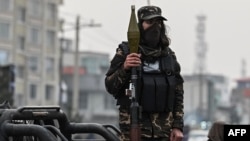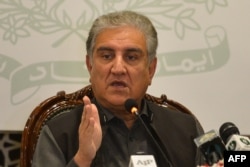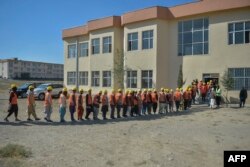Pakistan said Friday foreign ministers of six immediate neighbors of Afghanistan will gather in China next month to discuss economic and humanitarian upheavals facing the Taliban-ruled, conflict-torn country.
Pakistani Foreign Minister Shah Mehmood Qureshi told a news conference in Islamabad that his Russian counterpart, Sergey Lavrov, will also attend the Beijing-hosted two-day meeting starting March 30.
Qureshi said the discussions would focus on ways to protect the Afghan people from the humanitarian crisis and prevent an economic meltdown in Afghanistan.
"If there is, God forbid, an economic meltdown (in Afghanistan), its repercussions will hit not only Pakistan but other neighboring countries and the region at large," Qureshi cautioned.
The gathering in China will be the third such dialogue among Afghanistan's neighbors, including China, Iran, Pakistan, Tajikistan, Turkmenistan and Uzbekistan, since the Taliban takeover of the country in August.
Islamabad initiated and hosted the inaugural session of the process in September after the Taliban militarily seized power from the now-defunct Western-backed Afghan government and U.S.-led international forces withdrew from the country.
Tehran hosted the second foreign ministers' meeting in late October.
Trilateral on sideline
A senior Pakistani Foreign Ministry official told VOA that Taliban leaders will be invited to the two-day discussions in China to allow them to directly share their assessment of the latest Afghan situation.
The official, who requested anonymity because he is not authorized to speak to media, said a trilateral dialogue involving Afghanistan, Pakistan and China will also be held on the sidelines of the meeting.
He said Chinese and Pakistani officials are expected to discuss and propose economic connectivity projects to Taliban delegates under an ongoing mega-infrastructure development program China is funding in Pakistan. The official did not share further details.
The program, known as the China-Pakistan Economic Corridor (CPEC), is hailed as a flagship of Beijing's global Belt and Road Initiative. It has built roads, power plants and other infrastructure projects in Pakistan with Chinese investments over the past seven years.
"The two sides are ready to discuss with Afghanistan the extension of CPEC to Afghanistan," read a joint statement issued at the end of wide-ranging bilateral talks President Xi Jinping hosted with Pakistani Prime Minister Imran Khan in Beijing earlier this month.
Taliban legitimacy
When the Taliban regained control of Afghanistan six months ago, wide-ranging international sanctions dating back to the Islamist group's first time in power from 1996 to 2001 followed.
Washington and other Western nations also suspended financial aid to Kabul and immediately froze billions of dollars in the Afghan central bank's assets, mostly held in the U.S.
The restrictions have pushed the country's heavily aid-dependent economy to the brink of collapse, exacerbating the humanitarian crisis in Afghanistan, where the United Nations estimates around 23 million people, or 55 percent of the population, face acute hunger.
Foreign countries, including immediate neighbors, have not recognized the Taliban as the legitimate ruler of Afghanistan.
The global community wants the hardline group to govern Afghanistan through a broad-based ruling system that represents all Afghan ethnicities, respects human rights, including women's rights to education and work, and disallows terrorists from using the country for cross-border attacks.
Taliban leaders dismiss criticism of their government, saying it is representative of all Afghans, and women are being given access to education as well as work in accordance with Islamic Sharia law. They also claim no terrorist groups are being allowed to use the country for international attacks, assertions disputed by foreign officials and independent critics.
The Taliban under the previous government had banned females from education and work and harbored the al-Qaida terrorist network blamed for orchestrating the September 2001 attacks on the United States.







